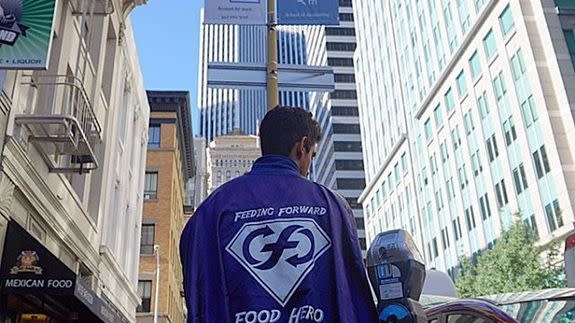The app that matches surplus food with the hungry

Plenty of businesses throw a ridiculous amount of catering into the garbage every day, often as people go hungry on the streets outside their office buildings.
What if there was a push-button way of matching the surplus with the demand? What if an app could actually be useful in this situation?
That's the premise behind Copia, a service for on-demand food donations. It offers an easy way for businesses to provide their uneaten food to nearby shelters and other nonprofits that provide food to people in need.
SEE ALSO: What 6 survivors of homelessness want you to know
Here's how it works: businesses, event hosts or any other group that wants to make a donation snaps a photo of their extra food — Copia takes anything, cooked or uncooked, packaged or unpackaged — and schedule a pickup time in the app or website.
The app then automatically matches the donation to a nearby organization and a cape-wearing driver (Copia calls them "food heroes") who completes the pickup and delivery.
For each donation, Copia creates a report that details exactly where the food went, and how many people it fed.
Technically, Copia is a for-profit company, structured as a public benefit corporation.
That may not sound like the best business model for a company structured around charitable giving, but it does enable Copia it to "sustain rapid growth and large-scale impact," according to its founder Komal Ahmad.
Copia charges businesses a fee per each pickup; in return the companies making the donation receive a tax write-off. Ahmad also did a stint in Y Combinator, the startup accelerator that launched Airbnb, Reddit and Dropbox.
Like any good startup, Copia takes a data driven approach to the service it provides. Food donations are matched to organizations based on an algorithm that factors in the type of food (as different organizations accept different types of food), location (food is never driven more than two hours away in order to preserve freshness) and frequency (so food is distributed as evenly as possible.)
The donating businesses can also pay extra to receive analytics and data that may be able to help them reduce future costs, according to Copia.
Copia is operating in the Bay Area only for now — with deliveries up an running San Francisco, Oakland, Palo Alto, Mountain View, Berkeley, San Jose, Santa Clara and Emeryville. The organization says it hopes to expand globally by 2017.
This post is part of the SF Homeless Project, a collaborative effort between more than 70 news outlets to bring attention to chronic homelessness in San Francisco.
